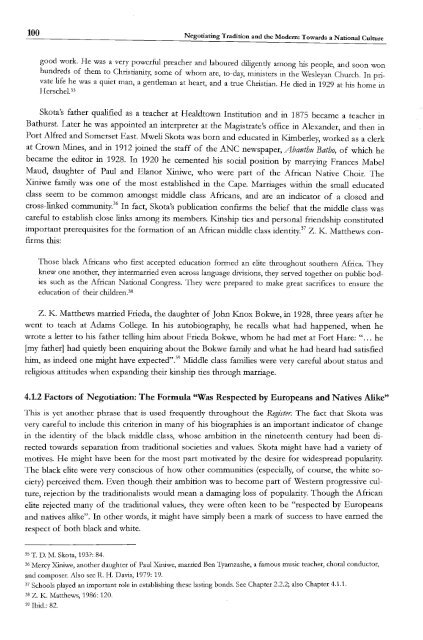South African Choral Music (Amakwaya): Song, Contest and the ...
South African Choral Music (Amakwaya): Song, Contest and the ...
South African Choral Music (Amakwaya): Song, Contest and the ...
Create successful ePaper yourself
Turn your PDF publications into a flip-book with our unique Google optimized e-Paper software.
100 Negotiating Tradition <strong>and</strong> <strong>the</strong> Modem: Towards a National Culture<br />
good work. He was a very powerful preacher <strong>and</strong> laboured diligently among his people, <strong>and</strong> soon won<br />
hundreds of <strong>the</strong>m to Christianity, some of whom are, to-day, ministers in <strong>the</strong> Wesleyan Church. In private<br />
life he was a quiet man, a gentleman at heart, <strong>and</strong> a true Christian. He died in 1929 at his home in<br />
Hersche1.35<br />
Skota's fa<strong>the</strong>r qualified as a teacher at Healdtown Institution <strong>and</strong> in 1875 became a teacher in<br />
Bathurst. Later he was appointed an interpreter at <strong>the</strong> Magistrate's office in Alex<strong>and</strong>er, <strong>and</strong> <strong>the</strong>n in<br />
Port Alfred <strong>and</strong> Somerset East. Mweli Skota was born <strong>and</strong> educated in Kimberley, worked as a clerk<br />
at Crown Mines, <strong>and</strong> in 1912 joined <strong>the</strong> staff of <strong>the</strong> ANC newspaper, Abanthu Batho, of which he<br />
became <strong>the</strong> editor in 1928. In 1920 he cemented his social position by marrying Frances Mabel<br />
Maud, daughter of Paul <strong>and</strong> Elanor Xiniwe, who were part of <strong>the</strong> <strong>African</strong> Native Choir. The<br />
Xiniwe family was one of <strong>the</strong> most established in <strong>the</strong> Cape. Marriages within <strong>the</strong> small educated<br />
class seem to be common amongst middle class <strong>African</strong>s, <strong>and</strong> are an indicator of a closed <strong>and</strong><br />
cross-linked community.36 In fact, Skota's publication confirms <strong>the</strong> belief that <strong>the</strong> middle class was<br />
careful to establish close links among its members. Kinship ties <strong>and</strong> personal friendship constituted<br />
important prerequisites for <strong>the</strong> formation of an <strong>African</strong> middle class identity.37 Z. K. Mat<strong>the</strong>ws confirms<br />
this:<br />
Those black <strong>African</strong>s who fttst accepted education formed an elite throughout sou<strong>the</strong>rn Africa. They<br />
knew one ano<strong>the</strong>r, <strong>the</strong>y intermarried even across language divisions, <strong>the</strong>y served toge<strong>the</strong>r on public bodies<br />
such as <strong>the</strong> <strong>African</strong> National Congress. They were prepared to make great sacrifices to ensure <strong>the</strong><br />
education of <strong>the</strong>ir children.38<br />
Z. K. Mat<strong>the</strong>ws married Frieda, <strong>the</strong> daughter of John Knox Bokwe, in 1928, three years after he<br />
went to teach at Adams College. In his autobiography, he recalls what had happened, when he<br />
wrote a letter to his fa<strong>the</strong>r telling him about Frieda Bokwe, whom he had met at Fort Hare: " ... he<br />
[my fa<strong>the</strong>r] had quietly been enquiring about <strong>the</strong> Bokwe family <strong>and</strong> what he had heard had satisfied<br />
him, as indeed one might have expected".39 Middle class families were very careful about status <strong>and</strong><br />
religious attitudes when exp<strong>and</strong>ing <strong>the</strong>ir kinship ties through marriage.<br />
4.1.2 Factors of Negotiation: The Formula "Was Respected by Europeans <strong>and</strong> Natives Alike"<br />
This is yet ano<strong>the</strong>r phrase that is used frequently throughout <strong>the</strong> Register. The fact that Skota was<br />
very careful to include this criterion in many of his biographies is an important indicator of change<br />
in <strong>the</strong> identity of <strong>the</strong> black middle class, whose ambition in <strong>the</strong> nineteenth century had been directed<br />
towards separation from traditional societies <strong>and</strong> values. Skota might have had a variety of<br />
motives. He might have been for <strong>the</strong> most part motivated by <strong>the</strong> desire for widespread popularity.<br />
The black elite were very conscious of how o<strong>the</strong>r communities (especially, of course, <strong>the</strong> white so<br />
ciety) perceived <strong>the</strong>m. Even though <strong>the</strong>ir ambition was to become part of Western progressive cul<br />
ture, rejection by <strong>the</strong> traditionalists would mean a damaging loss of popularity. Though <strong>the</strong> <strong>African</strong><br />
elite rejected many of <strong>the</strong> traditional values, <strong>the</strong>y were often keen to be "respected by Europeans<br />
<strong>and</strong> natives alike". In o<strong>the</strong>r words, it might have simply been a mark of success to have earned <strong>the</strong><br />
respect of both black <strong>and</strong> white.<br />
35 T. D. M. Skota, 193?: 84.<br />
36 Mercy Xiniwe, ano<strong>the</strong>r daughter of Paul Xiniwe, married Ben Tyamzashe, a famous music teacher, choral conductor,<br />
<strong>and</strong> composer. Also see R. H. Davis, 1979: 19.<br />
37 Schools played an important role in establishing <strong>the</strong>se lasting bonds. See Chapter 2.2.2; also Chapter 4.1.1.<br />
38 Z. K. Mat<strong>the</strong>ws, 1986: 120.<br />
39 Ibid.: 82.

















